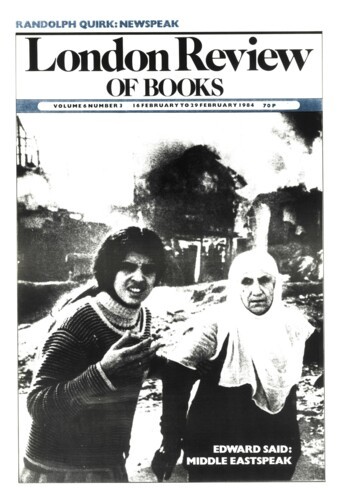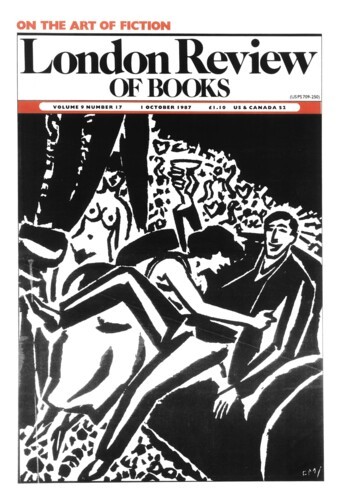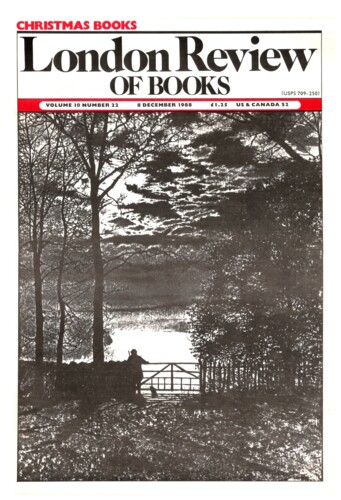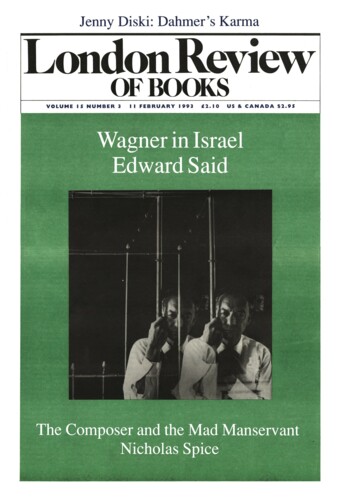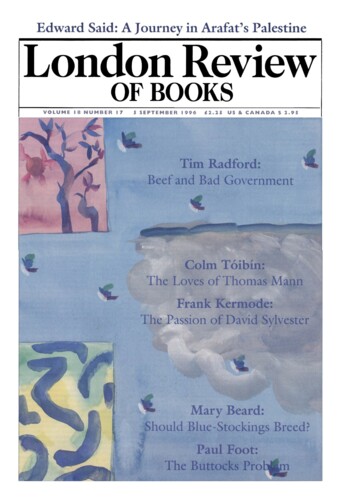Edward Said
Edward Said, who died in 2003, first contributed to the LRB in 1981.
Wrong Analogy
1 October 1987
Goodbye to Mahfouz
8 December 1988
Unfaithful to Wagner
11 February 1993
Arafat’s Palestine
5 September 1996
Pieces about Edward Said in the LRB
Going Against: Is There a Late Style?
Frank Kermode, 5 October 2006
The odd thing is that most of the contributors to these books doubt whether it is possible to offer a clear and distinct idea of the subject under discussion. Indeed, Karen Painter, one of the...
A Narrow Band of Liberties: global order
Glen Newey, 25 January 2001
In Being and Nothingness Sartre has an admirable passage about the stubborn human tendency to ‘fill’, the fact that a good part of human life, in politics as elsewhere, is devoted to...
What nations are for
Tom Nairn, 8 September 1994
The politics of dispossession is nationalism – an over-generalisation which at once calls for precise qualification. It is quite true that not all nationalists are dispossessed: possessors...
In the Wilderness
W.J.T. Mitchell, 8 April 1993
The Foundation of Empire is Art and Science. Remove them or Degrade them and the Empire is no more. Empire follows Art and not vice versa as Englishmen suppose. William Blake,...
Off the edge
Frank Kermode, 7 November 1991
The Wellek Library Lectures at the University of California, Irvine, are meant to be about Critical Theory, and up to now they have, for good or ill, been faithful (in their fashion) to that...
Insults
Richard Wollheim, 19 March 1987
Professor Bernard Lewis enjoys a worldwide reputation as a scholar of Near-Eastern history, and in his most recent work, Semites and Anti-Semites, he has chosen to concentrate his formidable...
Textual Harassment
Claude Rawson, 5 April 1984
In a recent review in this paper, Edward Said used the word ‘narrative’ about thirty times. This might have seemed a lot even in the present state of litcritspeak, and even in an...
Arabs
Malise Ruthven, 18 February 1982
Edward Said is the first Palestinian to have stormed the East Coast literary establishment. His achievement has partly been the result of what his more paranoid opponents must regard as his...
Making peace
Dan Gillon, 3 April 1980
The Palestinian problem has been the subject of world-wide debate for more than a decade. Yet the issue is not well understood. The debate, for all its volume and intensity, has rarely managed to...
Read anywhere with the London Review of Books app, available now from the App Store for Apple devices, Google Play for Android devices and Amazon for your Kindle Fire.
Sign up to our newsletter
For highlights from the latest issue, our archive and the blog, as well as news, events and exclusive promotions.
